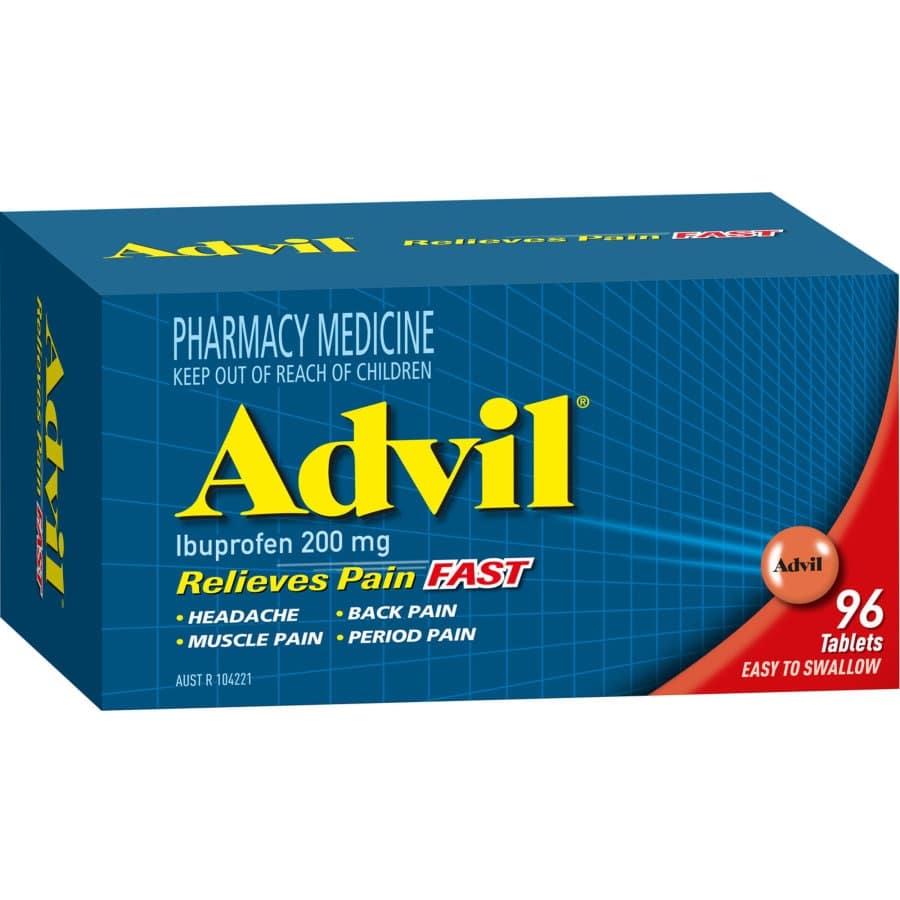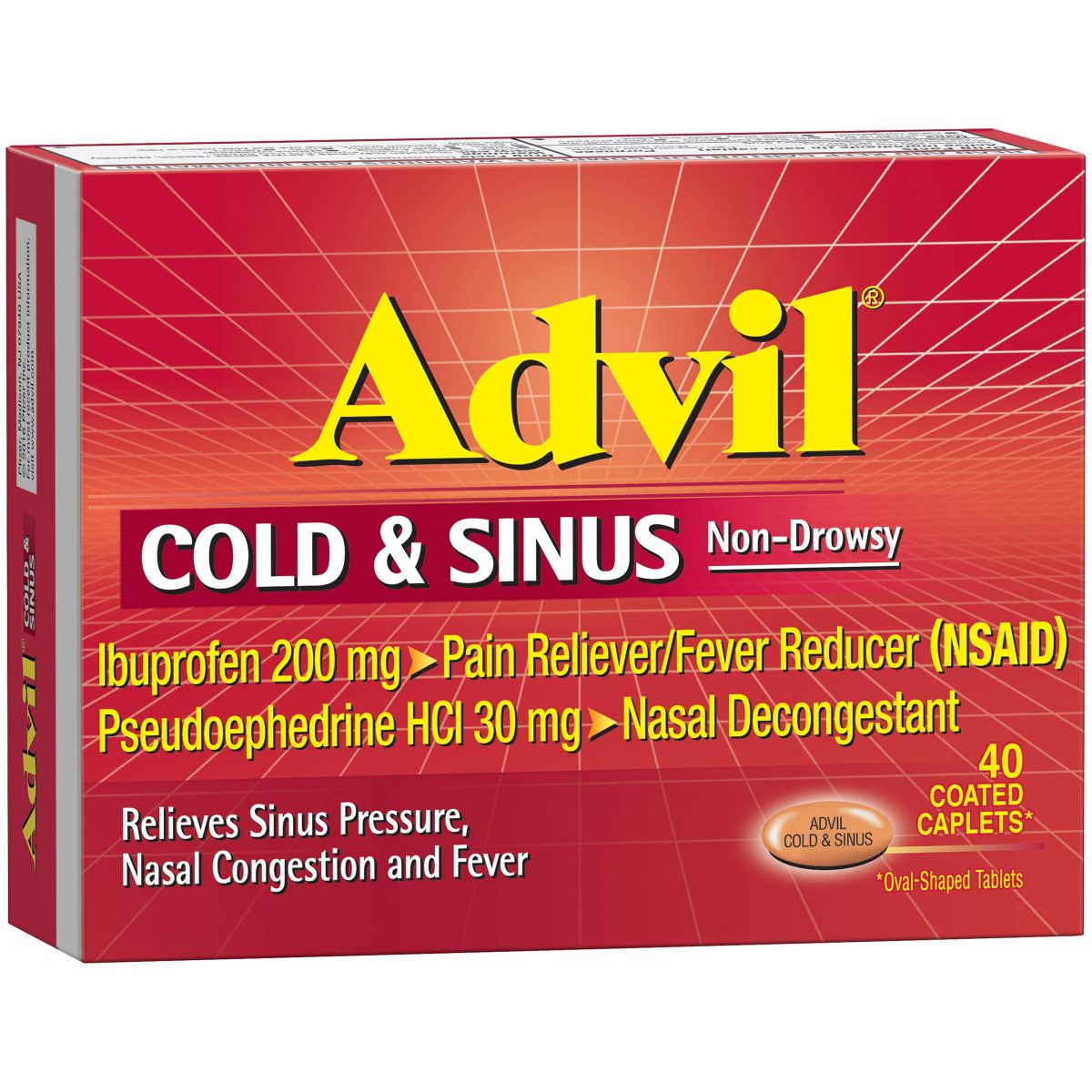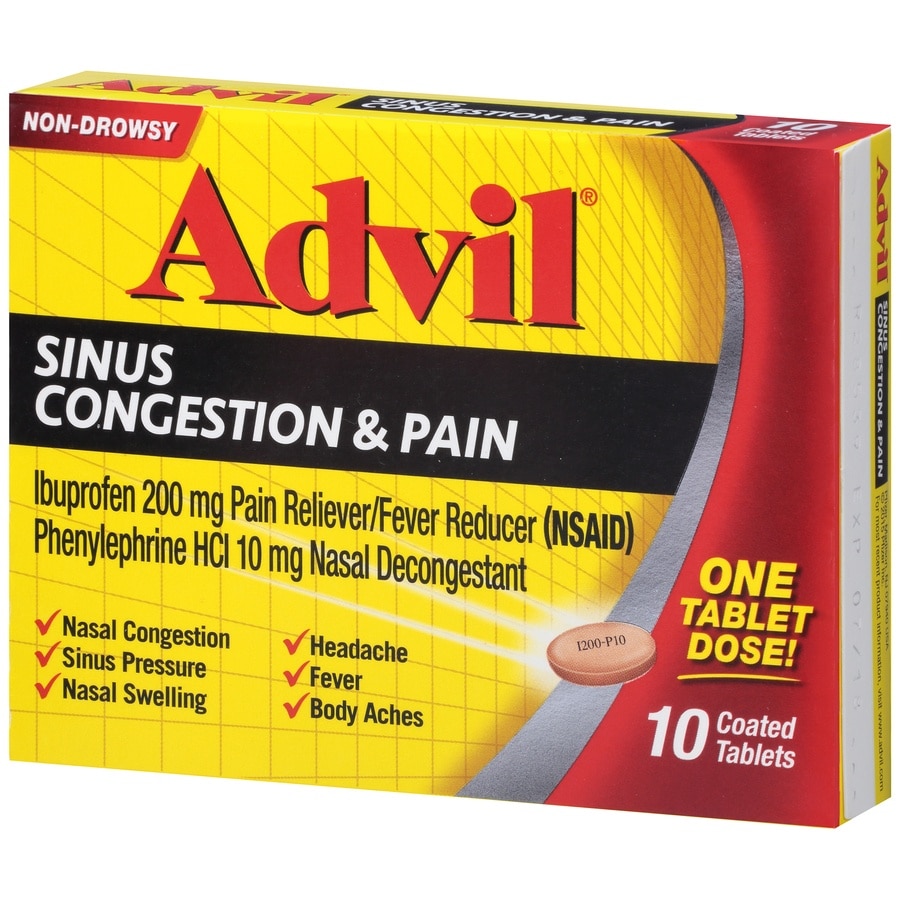Clinically Proven Efficacy In Sore Throat Pain
Ibuprofen offered statistically significant effective sore throat relief in the following study:
Clinical Pharmacology and Therapeutics, 1988
- A double-blind, single dose parallel study was conducted to evaluate treatment of sore throat pain. Ibuprofen was more effective on all rating scales from 180 to 360 minutes vs. acetaminophen and at all time points vs. placebo .14*
*Schachtel BP et al conducted a double-blind, single-dose parallel study of patients with tonsillopharyngitis who randomly received either 400 mg ibuprofen, 1000 mg acetaminophen or placebo. At hourly intervals for 6 hours, patients reported pain intensity and pain relief on conventional scales and two sensory qualities of throat pain on two new visual analogy scales.
How To Take Ibuprofen And Pseudoephedrine
Use Ibuprofen And Pseudoephedrine exactly as directed on the label, or as prescribed by your doctor. Do not use in larger or smaller amounts or for longer than recommended.
Use exactly as directed on the label, or as prescribed by your doctor. An overdose of ibuprofen can damage your stomach or intestines.
Take this medicine with food or milk to lessen stomach upset.
If you need surgery, tell the surgeon ahead of time if you have taken this medicine within the past few days.
Store at room temperature away from moisture and heat.
Since this medicine is used when needed, you may not be on a dosing schedule. Skip any missed dose if its almost time for your next dose. Do not use two doses at one time.
What Other Drugs Could Interact With This Medication
There may be an interaction between ibuprofen – pseudoephedrine and any of the following:
- aminoglycoside antibiotics
- angiotensin-converting enzyme inhibitors
- angiotensin receptor blockers
- “azole” antifungals
- beta-adrenergic blockers
- calcium channel blockers
- corticosteroids
- diabetes medications
- ergot alkaloids
- fast-acting bronchodilators
- herbs that may increase the risk of bleeding
- long-acting bronchodilators
- lumacaftor and ivacaftor
- quinolone antibiotics
- selective serotonin reuptake inhibitors
- serotonin-norepinephrine reuptake inhibitors
- sodium phosphates
- thyroid replacements
- tricyclic antidepressants
If you are taking any of these medications, speak with your doctor or pharmacist. Depending on your specific circumstances, your doctor may want you to:
- stop taking one of the medications,
- change one of the medications to another,
- change how you are taking one or both of the medications, or
- leave everything as is.
An interaction between two medications does not always mean that you must stop taking one of them. Speak to your doctor about how any drug interactions are being managed or should be managed.
All material copyright MediResource Inc. 1996 2022. Terms and conditions of use. The contents herein are for informational purposes only. Always seek the advice of your physician or other qualified health provider with any questions you may have regarding a medical condition. Source: www.medbroadcast.com/drug/getdrug/Advil-Cold-Sinus
Read Also: Is Allergies And Sinus The Same Thing
What Should I Watch For While Using This Medicine
Tell your doctor or healthcare provider if your symptoms do not start to get better or if they get worse. See your doctor if fever, pain, or nasal congestion gets worse or lasts more than 3 days.
If this medicine makes it hard for you to sleep, try taking the dose earlier in the day. If you still have trouble sleeping stop taking this medicine and see your doctor.
This medicine may cause serious skin reactions. They can happen weeks to months after starting the medicine. Contact your healthcare provider right away if you notice fevers or flu-like symptoms with a rash. The rash may be red or purple and then turn into blisters or peeling of the skin. Or, you might notice a red rash with swelling of the face, lips or lymph nodes in your neck or under your arms.
Advil Ibuprofen Tablets 200mg Sinus Congestion & Pain Non

- One package of 20 coated tablets of Advil Sinus Congestion and Pain, Sinus Medicine, Pain Reliever and Fever Reducer with Ibuprofen and Phenylephrine HCl
- Ibuprofen 200mg temporarily relieves fever, minor body aches and headache
- Phenylephrine HCl 10 mg tablets help relieve nasal congestion, sinus pressure and nasal swelling related to the common cold
- Coated tablets are easily portable, so you can have sinus congestion and pain relief ready whenever you need it
- Sinus congestion medicine for adults and children 12 years and older
Sinus Congestion & Pain, Coated Tablets
Non-drowsy. Ibuprofen 200 mg pain reliever/fever reducer . Phenylephrine HCI 10 mg nasal decongestant. Nasal congestion. Sinus pressure. Nasal swelling. Headache. Fever. Body aches. One tablet dose! Read and keep carton for complete warnings and information. www.advil.com. For most recent product information, visit www.advil.com. Questions or comments? Call weekdays from 9 AM to 5 PM EST toll free at 1-800-88-Advil.
In Each Tablet Directions: Do not take more than directed. Adults and Children 12 Years of Age and Over: Take 1 tablet every 4 hours while symptoms persist. Do not use more than 6 tablets in any 24-hour period unless directed by a doctor. Children Under 12 years of Age: Do not use because this product contains too much medication for children under this age.
Also Check: Essential Oils For Sinus Congestion Young Living
Does Ibuprofen Reduce Fever
The active ingredient in Advil is ibuprofen, an NSAID that is a pain reliever and fever reducer. Ibuprofen is the active ingredient in a range of over-the-counter medicines. Ibuprofen is classed as non-steroidal anti-inflammatory drug .
Body chemicals called prostaglandins produce pain and fever. Advil is an ibuprofen-based pain reliever brand that blocks the bodys production of these prostaglandins, therefore reducing pain and fever.
NSAIDs like ibuprofen are commonly used to manage mild to moderate pain , inflammation and fever in both adults and children.
Who Should Not Take This Medication
Do not take this medication if you:
- are allergic or sensitive to ibuprofen, pseudoephedrine, or any ingredients of the medication
- are allergic to other NSAIDs or ASA
- are about to have or have just had heart surgery
- are dehydrated due to vomiting, diarrhea, or not drinking enough fluids
- are taking another NSAID
- are pregnant or breast-feeding
- have taken a monoamine oxidase inhibitor within the last 14 days
- have thyroid disease
Also Check: Best Supplements For Sinus Infection
Stop Use And Ask A Doctor If
- you experience any of the following signs of stomach bleeding:
- have bloody or black stools
- have stomach pain that does not get better
- you have symptoms of heart problems or stroke:
- weakness in one part or side of body
- fever gets worse or lasts more than 3 days
- nasal congestion lasts for more than 7 days
- symptoms continue or get worse
- redness or swelling is present in the painful area
- you get nervous, dizzy, or sleepless
- any new symptoms appear
How Should I Use This Medicine
Take this medicine by mouth with a glass of water. Follow the directions on the package label. You can take it with or without food. If it upsets your stomach, take it with food. Try to not lie down for at least 10 minutes after you take the medicine. Take your medicine at regular intervals. Do not take it more often than directed.
Talk to your pediatrician regarding the use of this medicine in children. While this drug may be prescribed for children as young as 12 years old for selected conditions, precautions do apply.
Patients over 65 years old may have a stronger reaction and need a smaller dose.
Overdosage: If you think you have taken too much of this medicine contact a poison control center or emergency room at once.
NOTE: This medicine is only for you. Do not share this medicine with others.
Recommended Reading: Sinus Infection Loss Of Smell
What Are The Side Effects Of Ibuprofen/pseudoephedrine
With any medication, there are risks and benefits. Even if the medication is working, you may experience some unwanted side effects.
Contact your doctor immediately if you experience any of the following:
- Heart attack: chest pain or tightness, pain that radiates up to your shoulder, arm, neck, or jaw
- Stroke: chest pain, trouble breathing, weakness in one part of your body or face, slurred speech, leg swelling
- Stomach bleeding: feeling faint, vomiting blood, bloody or dark stools, severe stomach pain or discomfort
- Allergic reactions: hives, rash, blisters, swelling of the lips or tongue, difficulty breathing, skin reddening
The following side effects may get better over time as your body gets used to the medication. Let your doctor know immediately if you continue to experience these symptoms or if they worsen over time.
Also Check: Medicine To Relieve Sinus Congestion
Advil Cold & Sinus Liqui Gels
For over 20 years, people have trusted Advil Cold & Sinus for powerful, non-drowsy relief of their tough cold and sinus symptoms.
Many people attribute sinus pressure to an increase in mucus which blocks their airways. While it is true that increased mucus is a symptom of the common cold, it is not always what makes you feel so stuffed up. Sinus congestion can also be associated with the swelling of the tissues in the nose known as inflammation. The result is a shrinking of your airways.
Advil Cold & Sinus combines the relief of a strong decongestant to open your airways with the power of Advil to relieve the pain commonly associated with sinus pressure.
Temporarily relieves these symptoms associated with the common cold or flu:
- minor body aches & pains
12 years of age and older:
- 1 caplet/liquid-gel every 4 to 6 hours while symptoms persist. If symptoms do not respond to 1 caplet/liquid-gel, 2 may be used.
- Do not use more than 6 caplets/liquid-gels in 24 hours unless directed by a doctor.
Under 12 years of age:
- Solubilized ibuprofen equal to 200mg ibuprofen *
- Pseudoephedrine HCI 30 mg
*Nonsteroidal anti-inflammatory drug
Inactive Ingredients:
- D& C yellow no. 10, FD& C red no. 40, fractionated coconut oil, gelatin, pharmaceutical ink, polyethylene glycol, potassium hydroxide, purified water, sorbitan, sorbitol
Use as directed. Read complete warnings and information.
Recommended Reading: Urgent Care For Sinus Infection
Ask A Doctor Before Use If
- stomach bleeding warning applies to you
- you have problems or serious side effects from taking pain relievers or fever reducers
- you have a history of stomach problems, such as heartburn
- you have high blood pressure, heart disease, liver cirrhosis, kidney disease, asthma, thyroid disease, diabetes, have trouble urinating due to an enlarged prostate gland, or had a stroke
- you are taking a diuretic
What Side Effects Are Possible With This Medication

Many medications can cause side effects. A side effect is an unwanted response to a medication when it is taken in normal doses. Side effects can be mild or severe, temporary or permanent.
The side effects listed below are not experienced by everyone who takes this medication. If you are concerned about side effects, discuss the risks and benefits of this medication with your doctor.
The following side effects have been reported by at least 1% of people taking this medication. Many of these side effects can be managed, and some may go away on their own over time.
Contact your doctor if you experience these side effects and they are severe or bothersome. Your pharmacist may be able to advise you on managing side effects.
Although most of the side effects listed below dont happen very often, they could lead to serious problems if you do not seek medical attention.
Check with your doctor as soon as possible if any of the following side effects occur:
- blurred vision or other eye symptoms
- steroid medicines like prednisone or cortisone
- St. Johns Wort
This list may not describe all possible interactions. Give your health care provider a list of all the medicines, herbs, non-prescription drugs, or dietary supplements you use. Also tell them if you smoke, drink alcohol, or use illegal drugs. Some items may interact with your medicine.
You May Like: What Can I Take For A Sinus Infection While Pregnant
Read Also: What Antibiotics Help Sinus Infection
What Is The Maximum Amount Of Ibuprofen In A Day
Advil can be taken by adults and children aged 12 years and over.
For adults and children aged 12 years and above, Advil Tablets/Liquid Capsules/Rapid Release Tablets include an equivalent of 200 mg of ibuprofen. For these products, it is recommended to take 1 to 2 tablets or capsules, swallowed whole with water. If necessary, repeat dose every 4-6 hours. Do not exceed 6 tablets or liquid capsules in 24 hours. For Advil 12 Hour Extended Release tablets, it is recommended to take 1 tablet swallowed whole with water. Do not split, crush or chew. If necessary, repeat dose after 12 hours. Do not exceed 2 tablets in 24 hours.
Advil products for children under 12 years have different recommended doses and maximum limits per day depending on the age and weight of the child. Please refer to the specific Advil Childrenâs product to determine the appropriate dosing for your child.
If You Are An Adult Over 60
- management or monitoring precaution: Cardiovascular-Elderly are more sensitive to tachycardia and hypertensive effects. May exacerbate symptomatic coronary insufficiency. Genitourinary-May cause urinary retention. Neuro/Psych-May worsen cognitive impairment in some elderly with dementia. Insomnia risk.
- management or monitoring precaution: Gastrointestinal-Risk for ulceration or serious GI bleed highest with history of PUD or GI bleed. Renal-Risk for exacerbation of CKD. Cardiovascular-May exacerbate pre-existing hypertension or CHF. Risk of cardiovascular thrombotic events, including MI and stroke. This risk may occur early in treatment and increases with duration of use. Risk for reinfarction with minimal NSAID use post-MI. Contraindicated with CABG. Hepatic-Elevated hepatic transaminases may occur with chronic use.
Read Also: Best Way To Sleep With Sinus Drainage
How Should I Take Advil Cold & Sinus
Use exactly as directed on the label, or as prescribed by your doctor. An overdose of ibuprofen can damage your stomach or intestines.
Take Advil Cold & Sinus with food or milk to lessen stomach upset.
If you need surgery, tell the surgeon ahead of time if you have taken this medicine within the past few days.
Store at room temperature away from moisture and heat.
Typical Dosing For Advil Allergy Sinus
Each caplet contains 200 mg of ibuprofen, 30 mg of pseudoephedrine, and 2 mg of chlorpheniramine.
- Adults and children age 12 years and up: The typical dose is 1 caplet by mouth every 4 to 6 hours while youre having symptoms. Dont use more than 6 caplets in a 24-hour period unless your provider specifically told you to do so.
- Children under 12 years of age: Ask your childs provider.
Read Also: Do I Have Sinus Issues
Advil Cold & Sinus Side Effects
Get emergency medical help if you have signs of an allergic reactionor a severe skin reaction .
Get emergency medical help if you have signs of a heart attack or stroke: chest pain spreading to your jaw or shoulder, sudden numbness or weakness on one side of the body, slurred speech, leg swelling, feeling short of breath.
Stop using Advil Cold & Sinus and call your doctor at once if you have:
-
confusion, severe drowsiness, ringing in your ears, severe dizziness, feeling like you might pass out
-
fast, pounding, or uneven heartbeat
-
easy bruising or bleeding
-
a skin rash, no matter how mild
-
signs of stomach bleedingbloody or tarry stools, coughing up blood or vomit that looks like coffee grounds
-
liver problemsloss of appetite, stomach pain , tiredness, itching, dark urine, clay-colored stools, jaundice
-
kidney problemslittle or no urination, swelling in your feet or ankles, feeling tired or short of breath or
-
nerve problemsfever, headache, neck stiffness, chills, increased sensitivity to light, seizure .
Common side effects may include:
What Form Does This Medication Come In
Liqui-Gels
Each light gold, liquid-filled gelatin capsule contains 200 mg of ibuprofen and 30 mg of pseudoephedrine. Nonmedicinal ingredients: D& C Yellow No. 10, FD& C Red No. 40, fractionated coconut oil, gelatin, iron oxide, polyethylene glycol, polyvinyl acetate phthalate, potassium hydroxide, propylene glycol, purified water, sorbitan, and sorbitol.
Caplets
Each beige, sugar-coated caplet contains 200 mg of ibuprofen and 30 mg of pseudoephedrine. Nonmedicinal ingredients: acetylated monoglyceride, ammonium hydroxide, carnauba wax, cellulose, cornstarch, croscarmellose sodium, iron oxides, parabens, pharmaceutical glaze, pharmaceutical shellac, povidone, pregelatinized starch, silicon dioxide, sodium benzoate, sodium lauryl sulfate, stearic acid, sucrose, and titanium dioxide.
Daytime
Each caplet contains 200 mg of ibuprofen and 30 mg of pseudoephedrine. Nonmedicinal ingredients: acetylated monoglycerides, carnauba wax, cellulose, cornstarch, croscarmellose sodium, ethoxyethanol, iron oxides, lecithin, parabens, pharmaceutical glaze, pharmaceutical shellac, povidone, pregelatinized starch, silicon dioxide, simethicone, sodium benzoate, sodium lauryl sulfate, stearic acid, sucrose, and titanium dioxide.
Don’t Miss: How To Treat Sinus Ear Pressure
What Are The Dosages Of Ibuprofen/pseudoephedrine
Dosages of Ibuprofen/Pseudoephedrine:
Dosage Considerations Should be Given as Follows:
Cold Symptoms
- Adults and children over 12 years: 1 caplet/capsule orally every 4-6 hours as needed may increase to 2 caplets/capsules every 4-6 hours if necessary while symptoms persist
- Not to exceed 6 doses/24 hours
- Children under 12 years: Safety and efficacy not established
How Can I Help Avoid Catching A Cold Or Flu

Here are some top tips to help you avoid getting a cold or flu:17
- Wash your hands regularly, especially after contact with others
- Avoid touching your nose and eyes, as they are the most common places for germs to get in
- Get enough sleep
- Exercise regularly to help enhance immune functions
- Avoid close contact with those who are experiencing cold and flu symptoms
Recommended Reading: Tylenol Sinus Cold And Flu